BSc Business Management: Learning and Development Essay on Performance
VerifiedAdded on 2023/06/06
|8
|3098
|446
Essay
AI Summary
This essay examines the critical role of organizational learning in enhancing business performance. It defines organizational learning as the process of knowledge creation, transfer, and retention within a company, emphasizing its impact on employee growth and skill development. The essay explores the concept of learning organizations, highlighting their characteristics and principles. It contrasts organizational learning with learning organizations, emphasizing the former's focus on daily activities and the latter's emphasis on employee capability development. The essay delves into the measurement of organizational performance, including financial, market, and shareholder outcomes, as well as internal and external environmental factors influencing performance. It discusses the importance of top management and employee education in driving organizational success. The essay also explores the benefits of organizational learning, such as improved employee engagement, efficiency, and productivity, and its contribution to sustainable competitive advantage. It emphasizes the importance of aligning learning and development with company goals and identifying skill gaps to bridge them effectively.
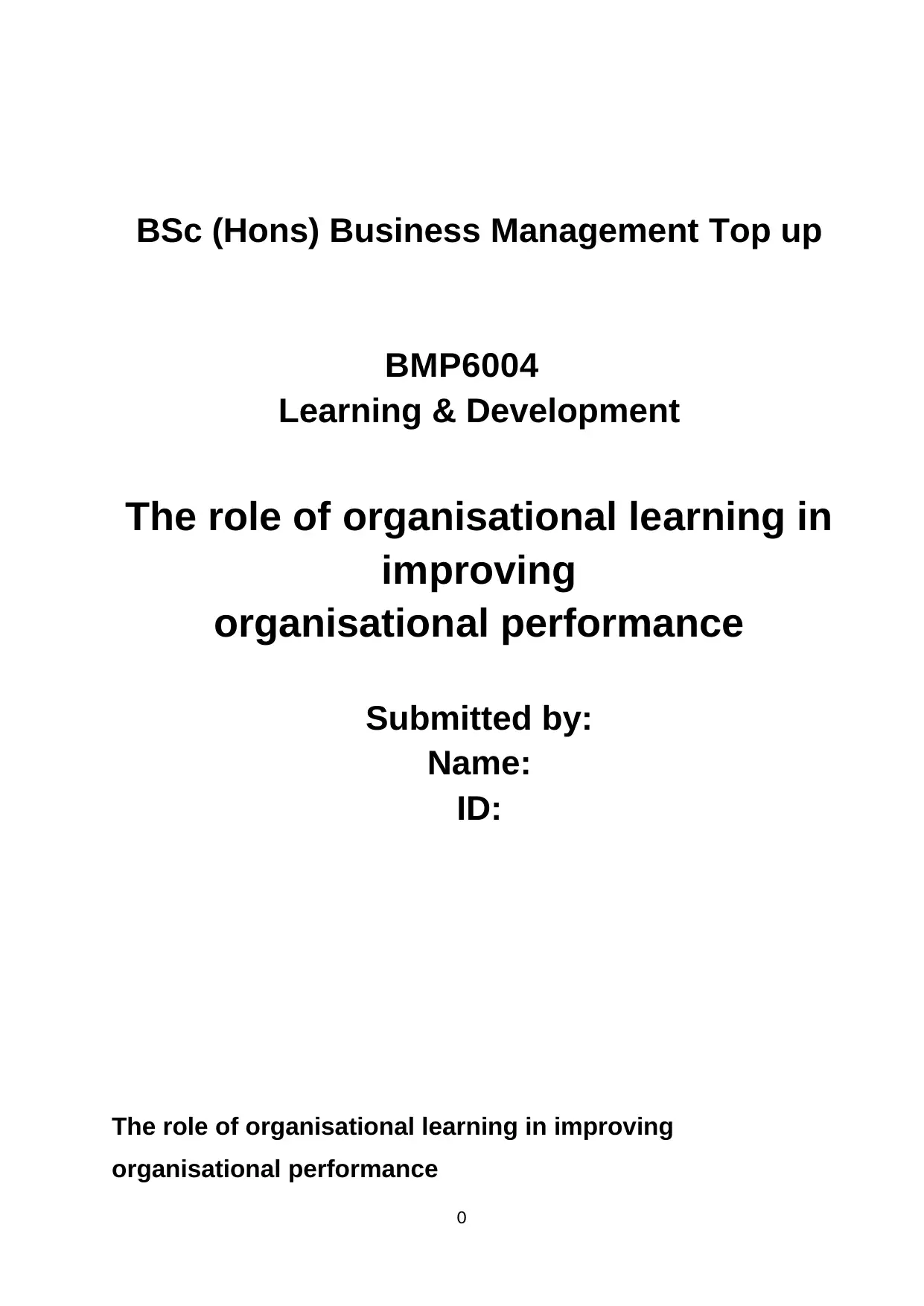
BSc (Hons) Business Management Top up
BMP6004
Learning & Development
The role of organisational learning in
improving
organisational performance
Submitted by:
Name:
ID:
The role of organisational learning in improving
organisational performance
0
BMP6004
Learning & Development
The role of organisational learning in
improving
organisational performance
Submitted by:
Name:
ID:
The role of organisational learning in improving
organisational performance
0
Paraphrase This Document
Need a fresh take? Get an instant paraphrase of this document with our AI Paraphraser
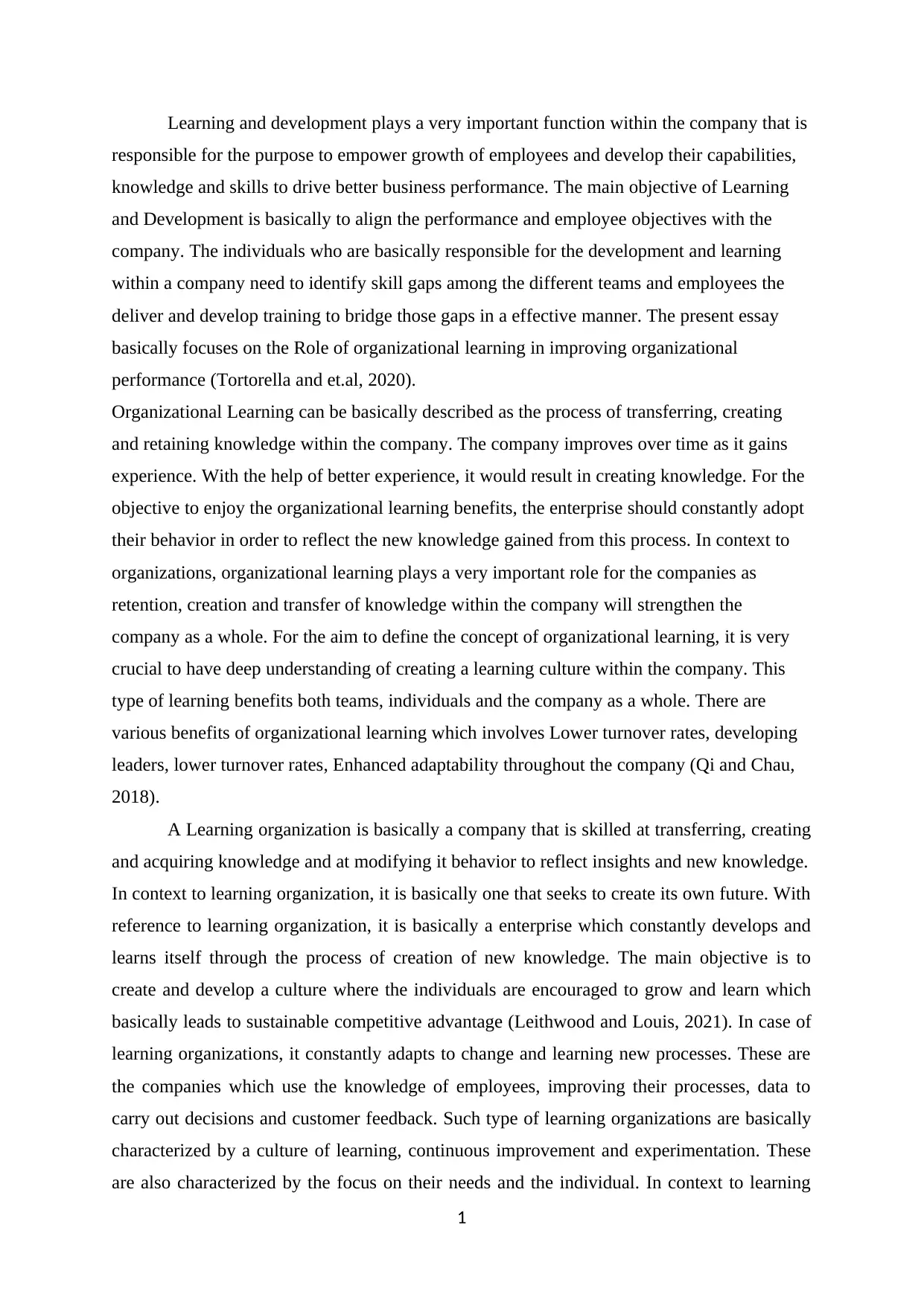
Learning and development plays a very important function within the company that is
responsible for the purpose to empower growth of employees and develop their capabilities,
knowledge and skills to drive better business performance. The main objective of Learning
and Development is basically to align the performance and employee objectives with the
company. The individuals who are basically responsible for the development and learning
within a company need to identify skill gaps among the different teams and employees the
deliver and develop training to bridge those gaps in a effective manner. The present essay
basically focuses on the Role of organizational learning in improving organizational
performance (Tortorella and et.al, 2020).
Organizational Learning can be basically described as the process of transferring, creating
and retaining knowledge within the company. The company improves over time as it gains
experience. With the help of better experience, it would result in creating knowledge. For the
objective to enjoy the organizational learning benefits, the enterprise should constantly adopt
their behavior in order to reflect the new knowledge gained from this process. In context to
organizations, organizational learning plays a very important role for the companies as
retention, creation and transfer of knowledge within the company will strengthen the
company as a whole. For the aim to define the concept of organizational learning, it is very
crucial to have deep understanding of creating a learning culture within the company. This
type of learning benefits both teams, individuals and the company as a whole. There are
various benefits of organizational learning which involves Lower turnover rates, developing
leaders, lower turnover rates, Enhanced adaptability throughout the company (Qi and Chau,
2018).
A Learning organization is basically a company that is skilled at transferring, creating
and acquiring knowledge and at modifying it behavior to reflect insights and new knowledge.
In context to learning organization, it is basically one that seeks to create its own future. With
reference to learning organization, it is basically a enterprise which constantly develops and
learns itself through the process of creation of new knowledge. The main objective is to
create and develop a culture where the individuals are encouraged to grow and learn which
basically leads to sustainable competitive advantage (Leithwood and Louis, 2021). In case of
learning organizations, it constantly adapts to change and learning new processes. These are
the companies which use the knowledge of employees, improving their processes, data to
carry out decisions and customer feedback. Such type of learning organizations are basically
characterized by a culture of learning, continuous improvement and experimentation. These
are also characterized by the focus on their needs and the individual. In context to learning
1
responsible for the purpose to empower growth of employees and develop their capabilities,
knowledge and skills to drive better business performance. The main objective of Learning
and Development is basically to align the performance and employee objectives with the
company. The individuals who are basically responsible for the development and learning
within a company need to identify skill gaps among the different teams and employees the
deliver and develop training to bridge those gaps in a effective manner. The present essay
basically focuses on the Role of organizational learning in improving organizational
performance (Tortorella and et.al, 2020).
Organizational Learning can be basically described as the process of transferring, creating
and retaining knowledge within the company. The company improves over time as it gains
experience. With the help of better experience, it would result in creating knowledge. For the
objective to enjoy the organizational learning benefits, the enterprise should constantly adopt
their behavior in order to reflect the new knowledge gained from this process. In context to
organizations, organizational learning plays a very important role for the companies as
retention, creation and transfer of knowledge within the company will strengthen the
company as a whole. For the aim to define the concept of organizational learning, it is very
crucial to have deep understanding of creating a learning culture within the company. This
type of learning benefits both teams, individuals and the company as a whole. There are
various benefits of organizational learning which involves Lower turnover rates, developing
leaders, lower turnover rates, Enhanced adaptability throughout the company (Qi and Chau,
2018).
A Learning organization is basically a company that is skilled at transferring, creating
and acquiring knowledge and at modifying it behavior to reflect insights and new knowledge.
In context to learning organization, it is basically one that seeks to create its own future. With
reference to learning organization, it is basically a enterprise which constantly develops and
learns itself through the process of creation of new knowledge. The main objective is to
create and develop a culture where the individuals are encouraged to grow and learn which
basically leads to sustainable competitive advantage (Leithwood and Louis, 2021). In case of
learning organizations, it constantly adapts to change and learning new processes. These are
the companies which use the knowledge of employees, improving their processes, data to
carry out decisions and customer feedback. Such type of learning organizations are basically
characterized by a culture of learning, continuous improvement and experimentation. These
are also characterized by the focus on their needs and the individual. In context to learning
1
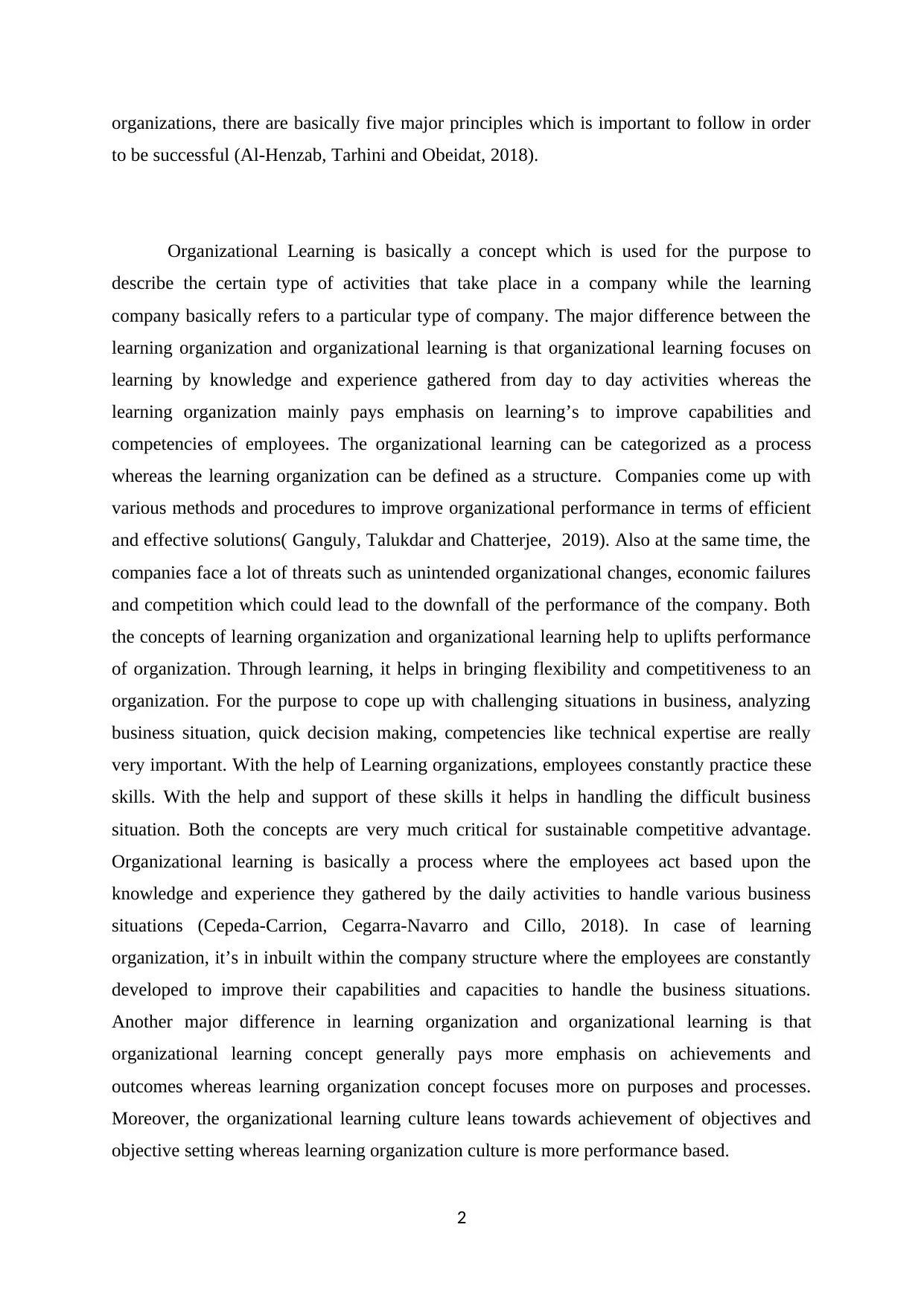
organizations, there are basically five major principles which is important to follow in order
to be successful (Al-Henzab, Tarhini and Obeidat, 2018).
Organizational Learning is basically a concept which is used for the purpose to
describe the certain type of activities that take place in a company while the learning
company basically refers to a particular type of company. The major difference between the
learning organization and organizational learning is that organizational learning focuses on
learning by knowledge and experience gathered from day to day activities whereas the
learning organization mainly pays emphasis on learning’s to improve capabilities and
competencies of employees. The organizational learning can be categorized as a process
whereas the learning organization can be defined as a structure. Companies come up with
various methods and procedures to improve organizational performance in terms of efficient
and effective solutions( Ganguly, Talukdar and Chatterjee, 2019). Also at the same time, the
companies face a lot of threats such as unintended organizational changes, economic failures
and competition which could lead to the downfall of the performance of the company. Both
the concepts of learning organization and organizational learning help to uplifts performance
of organization. Through learning, it helps in bringing flexibility and competitiveness to an
organization. For the purpose to cope up with challenging situations in business, analyzing
business situation, quick decision making, competencies like technical expertise are really
very important. With the help of Learning organizations, employees constantly practice these
skills. With the help and support of these skills it helps in handling the difficult business
situation. Both the concepts are very much critical for sustainable competitive advantage.
Organizational learning is basically a process where the employees act based upon the
knowledge and experience they gathered by the daily activities to handle various business
situations (Cepeda-Carrion, Cegarra-Navarro and Cillo, 2018). In case of learning
organization, it’s in inbuilt within the company structure where the employees are constantly
developed to improve their capabilities and capacities to handle the business situations.
Another major difference in learning organization and organizational learning is that
organizational learning concept generally pays more emphasis on achievements and
outcomes whereas learning organization concept focuses more on purposes and processes.
Moreover, the organizational learning culture leans towards achievement of objectives and
objective setting whereas learning organization culture is more performance based.
2
to be successful (Al-Henzab, Tarhini and Obeidat, 2018).
Organizational Learning is basically a concept which is used for the purpose to
describe the certain type of activities that take place in a company while the learning
company basically refers to a particular type of company. The major difference between the
learning organization and organizational learning is that organizational learning focuses on
learning by knowledge and experience gathered from day to day activities whereas the
learning organization mainly pays emphasis on learning’s to improve capabilities and
competencies of employees. The organizational learning can be categorized as a process
whereas the learning organization can be defined as a structure. Companies come up with
various methods and procedures to improve organizational performance in terms of efficient
and effective solutions( Ganguly, Talukdar and Chatterjee, 2019). Also at the same time, the
companies face a lot of threats such as unintended organizational changes, economic failures
and competition which could lead to the downfall of the performance of the company. Both
the concepts of learning organization and organizational learning help to uplifts performance
of organization. Through learning, it helps in bringing flexibility and competitiveness to an
organization. For the purpose to cope up with challenging situations in business, analyzing
business situation, quick decision making, competencies like technical expertise are really
very important. With the help of Learning organizations, employees constantly practice these
skills. With the help and support of these skills it helps in handling the difficult business
situation. Both the concepts are very much critical for sustainable competitive advantage.
Organizational learning is basically a process where the employees act based upon the
knowledge and experience they gathered by the daily activities to handle various business
situations (Cepeda-Carrion, Cegarra-Navarro and Cillo, 2018). In case of learning
organization, it’s in inbuilt within the company structure where the employees are constantly
developed to improve their capabilities and capacities to handle the business situations.
Another major difference in learning organization and organizational learning is that
organizational learning concept generally pays more emphasis on achievements and
outcomes whereas learning organization concept focuses more on purposes and processes.
Moreover, the organizational learning culture leans towards achievement of objectives and
objective setting whereas learning organization culture is more performance based.
2
⊘ This is a preview!⊘
Do you want full access?
Subscribe today to unlock all pages.

Trusted by 1+ million students worldwide
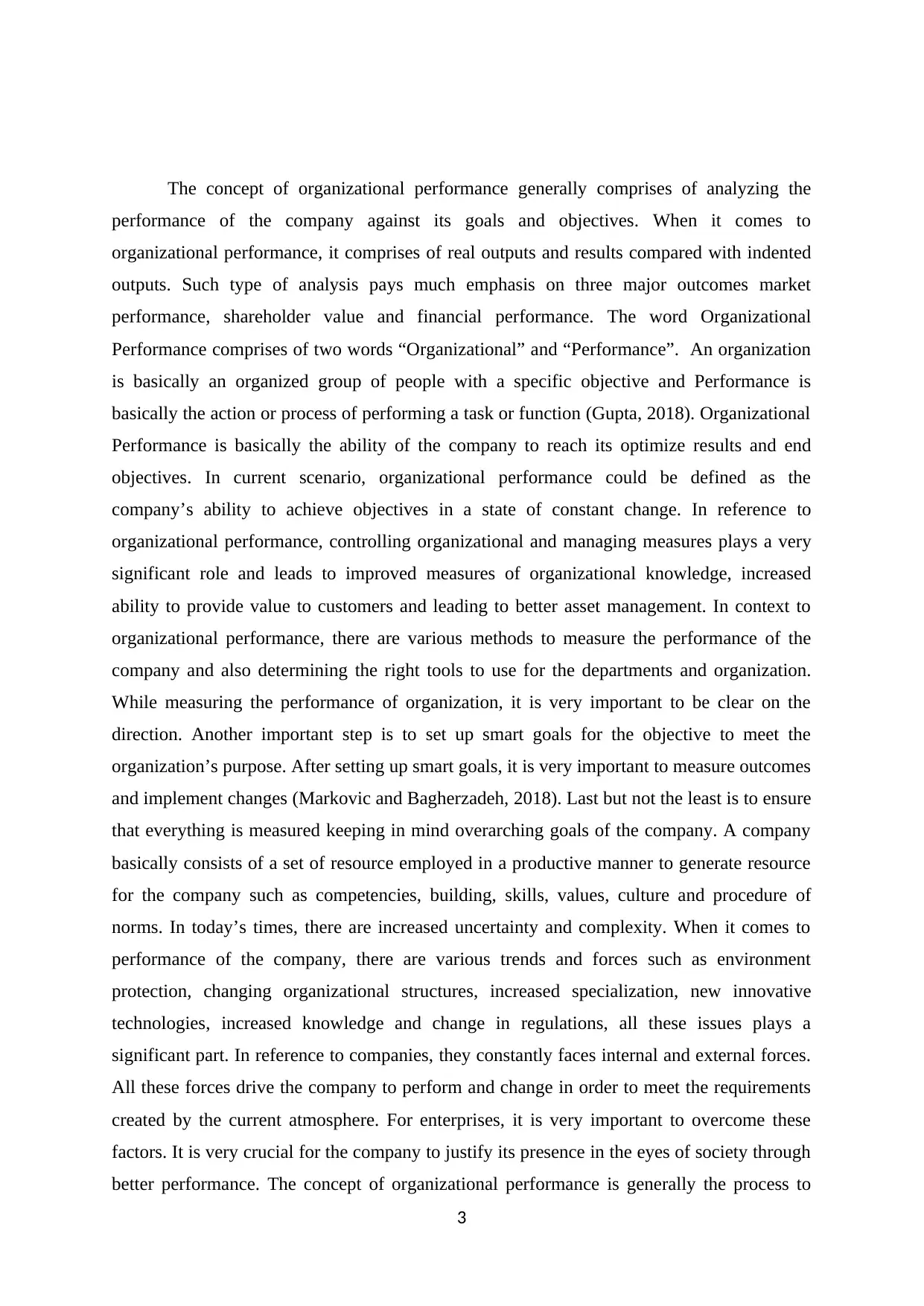
The concept of organizational performance generally comprises of analyzing the
performance of the company against its goals and objectives. When it comes to
organizational performance, it comprises of real outputs and results compared with indented
outputs. Such type of analysis pays much emphasis on three major outcomes market
performance, shareholder value and financial performance. The word Organizational
Performance comprises of two words “Organizational” and “Performance”. An organization
is basically an organized group of people with a specific objective and Performance is
basically the action or process of performing a task or function (Gupta, 2018). Organizational
Performance is basically the ability of the company to reach its optimize results and end
objectives. In current scenario, organizational performance could be defined as the
company’s ability to achieve objectives in a state of constant change. In reference to
organizational performance, controlling organizational and managing measures plays a very
significant role and leads to improved measures of organizational knowledge, increased
ability to provide value to customers and leading to better asset management. In context to
organizational performance, there are various methods to measure the performance of the
company and also determining the right tools to use for the departments and organization.
While measuring the performance of organization, it is very important to be clear on the
direction. Another important step is to set up smart goals for the objective to meet the
organization’s purpose. After setting up smart goals, it is very important to measure outcomes
and implement changes (Markovic and Bagherzadeh, 2018). Last but not the least is to ensure
that everything is measured keeping in mind overarching goals of the company. A company
basically consists of a set of resource employed in a productive manner to generate resource
for the company such as competencies, building, skills, values, culture and procedure of
norms. In today’s times, there are increased uncertainty and complexity. When it comes to
performance of the company, there are various trends and forces such as environment
protection, changing organizational structures, increased specialization, new innovative
technologies, increased knowledge and change in regulations, all these issues plays a
significant part. In reference to companies, they constantly faces internal and external forces.
All these forces drive the company to perform and change in order to meet the requirements
created by the current atmosphere. For enterprises, it is very important to overcome these
factors. It is very crucial for the company to justify its presence in the eyes of society through
better performance. The concept of organizational performance is generally the process to
3
performance of the company against its goals and objectives. When it comes to
organizational performance, it comprises of real outputs and results compared with indented
outputs. Such type of analysis pays much emphasis on three major outcomes market
performance, shareholder value and financial performance. The word Organizational
Performance comprises of two words “Organizational” and “Performance”. An organization
is basically an organized group of people with a specific objective and Performance is
basically the action or process of performing a task or function (Gupta, 2018). Organizational
Performance is basically the ability of the company to reach its optimize results and end
objectives. In current scenario, organizational performance could be defined as the
company’s ability to achieve objectives in a state of constant change. In reference to
organizational performance, controlling organizational and managing measures plays a very
significant role and leads to improved measures of organizational knowledge, increased
ability to provide value to customers and leading to better asset management. In context to
organizational performance, there are various methods to measure the performance of the
company and also determining the right tools to use for the departments and organization.
While measuring the performance of organization, it is very important to be clear on the
direction. Another important step is to set up smart goals for the objective to meet the
organization’s purpose. After setting up smart goals, it is very important to measure outcomes
and implement changes (Markovic and Bagherzadeh, 2018). Last but not the least is to ensure
that everything is measured keeping in mind overarching goals of the company. A company
basically consists of a set of resource employed in a productive manner to generate resource
for the company such as competencies, building, skills, values, culture and procedure of
norms. In today’s times, there are increased uncertainty and complexity. When it comes to
performance of the company, there are various trends and forces such as environment
protection, changing organizational structures, increased specialization, new innovative
technologies, increased knowledge and change in regulations, all these issues plays a
significant part. In reference to companies, they constantly faces internal and external forces.
All these forces drive the company to perform and change in order to meet the requirements
created by the current atmosphere. For enterprises, it is very important to overcome these
factors. It is very crucial for the company to justify its presence in the eyes of society through
better performance. The concept of organizational performance is generally the process to
3
Paraphrase This Document
Need a fresh take? Get an instant paraphrase of this document with our AI Paraphraser
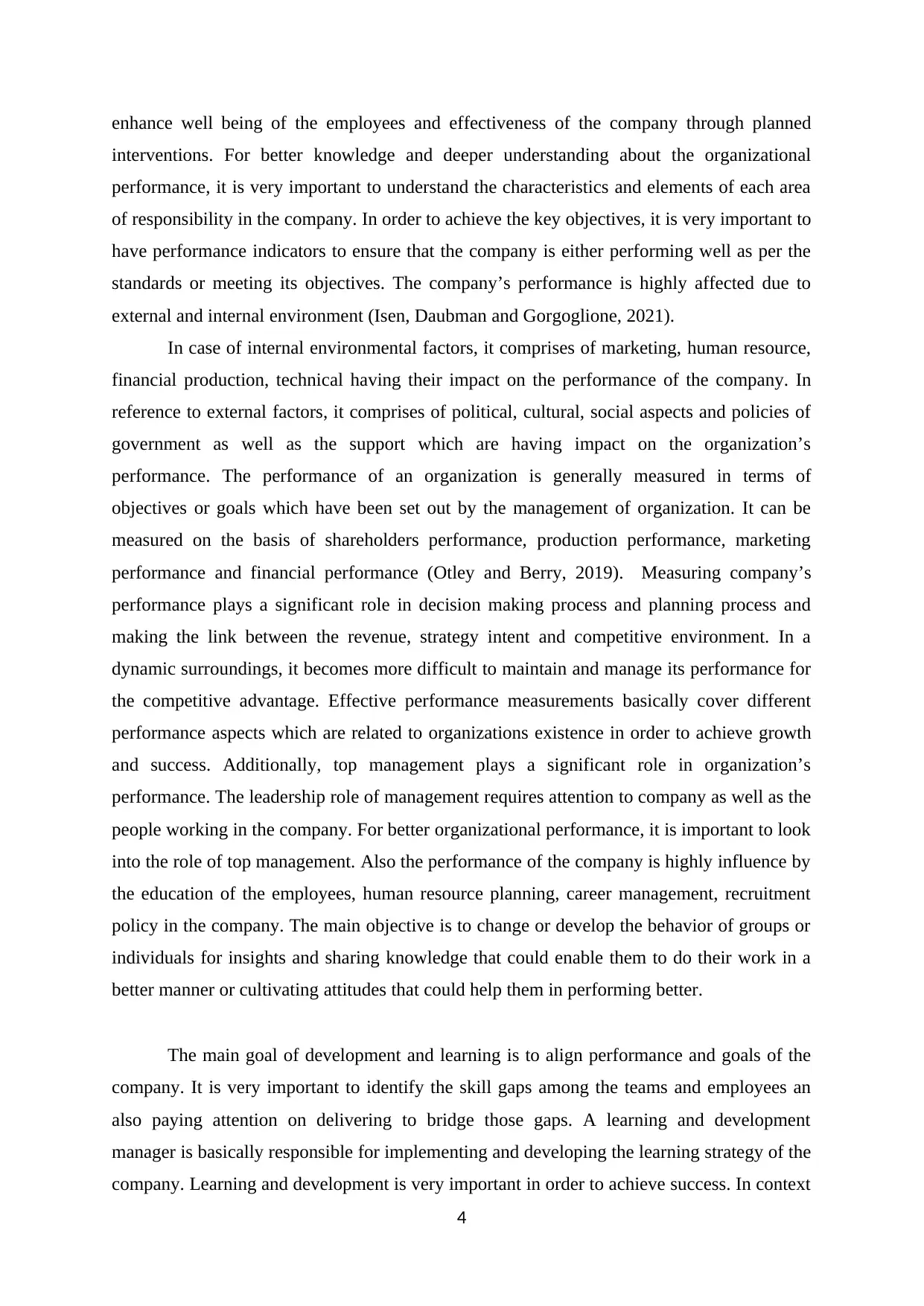
enhance well being of the employees and effectiveness of the company through planned
interventions. For better knowledge and deeper understanding about the organizational
performance, it is very important to understand the characteristics and elements of each area
of responsibility in the company. In order to achieve the key objectives, it is very important to
have performance indicators to ensure that the company is either performing well as per the
standards or meeting its objectives. The company’s performance is highly affected due to
external and internal environment (Isen, Daubman and Gorgoglione, 2021).
In case of internal environmental factors, it comprises of marketing, human resource,
financial production, technical having their impact on the performance of the company. In
reference to external factors, it comprises of political, cultural, social aspects and policies of
government as well as the support which are having impact on the organization’s
performance. The performance of an organization is generally measured in terms of
objectives or goals which have been set out by the management of organization. It can be
measured on the basis of shareholders performance, production performance, marketing
performance and financial performance (Otley and Berry, 2019). Measuring company’s
performance plays a significant role in decision making process and planning process and
making the link between the revenue, strategy intent and competitive environment. In a
dynamic surroundings, it becomes more difficult to maintain and manage its performance for
the competitive advantage. Effective performance measurements basically cover different
performance aspects which are related to organizations existence in order to achieve growth
and success. Additionally, top management plays a significant role in organization’s
performance. The leadership role of management requires attention to company as well as the
people working in the company. For better organizational performance, it is important to look
into the role of top management. Also the performance of the company is highly influence by
the education of the employees, human resource planning, career management, recruitment
policy in the company. The main objective is to change or develop the behavior of groups or
individuals for insights and sharing knowledge that could enable them to do their work in a
better manner or cultivating attitudes that could help them in performing better.
The main goal of development and learning is to align performance and goals of the
company. It is very important to identify the skill gaps among the teams and employees an
also paying attention on delivering to bridge those gaps. A learning and development
manager is basically responsible for implementing and developing the learning strategy of the
company. Learning and development is very important in order to achieve success. In context
4
interventions. For better knowledge and deeper understanding about the organizational
performance, it is very important to understand the characteristics and elements of each area
of responsibility in the company. In order to achieve the key objectives, it is very important to
have performance indicators to ensure that the company is either performing well as per the
standards or meeting its objectives. The company’s performance is highly affected due to
external and internal environment (Isen, Daubman and Gorgoglione, 2021).
In case of internal environmental factors, it comprises of marketing, human resource,
financial production, technical having their impact on the performance of the company. In
reference to external factors, it comprises of political, cultural, social aspects and policies of
government as well as the support which are having impact on the organization’s
performance. The performance of an organization is generally measured in terms of
objectives or goals which have been set out by the management of organization. It can be
measured on the basis of shareholders performance, production performance, marketing
performance and financial performance (Otley and Berry, 2019). Measuring company’s
performance plays a significant role in decision making process and planning process and
making the link between the revenue, strategy intent and competitive environment. In a
dynamic surroundings, it becomes more difficult to maintain and manage its performance for
the competitive advantage. Effective performance measurements basically cover different
performance aspects which are related to organizations existence in order to achieve growth
and success. Additionally, top management plays a significant role in organization’s
performance. The leadership role of management requires attention to company as well as the
people working in the company. For better organizational performance, it is important to look
into the role of top management. Also the performance of the company is highly influence by
the education of the employees, human resource planning, career management, recruitment
policy in the company. The main objective is to change or develop the behavior of groups or
individuals for insights and sharing knowledge that could enable them to do their work in a
better manner or cultivating attitudes that could help them in performing better.
The main goal of development and learning is to align performance and goals of the
company. It is very important to identify the skill gaps among the teams and employees an
also paying attention on delivering to bridge those gaps. A learning and development
manager is basically responsible for implementing and developing the learning strategy of the
company. Learning and development is very important in order to achieve success. In context
4
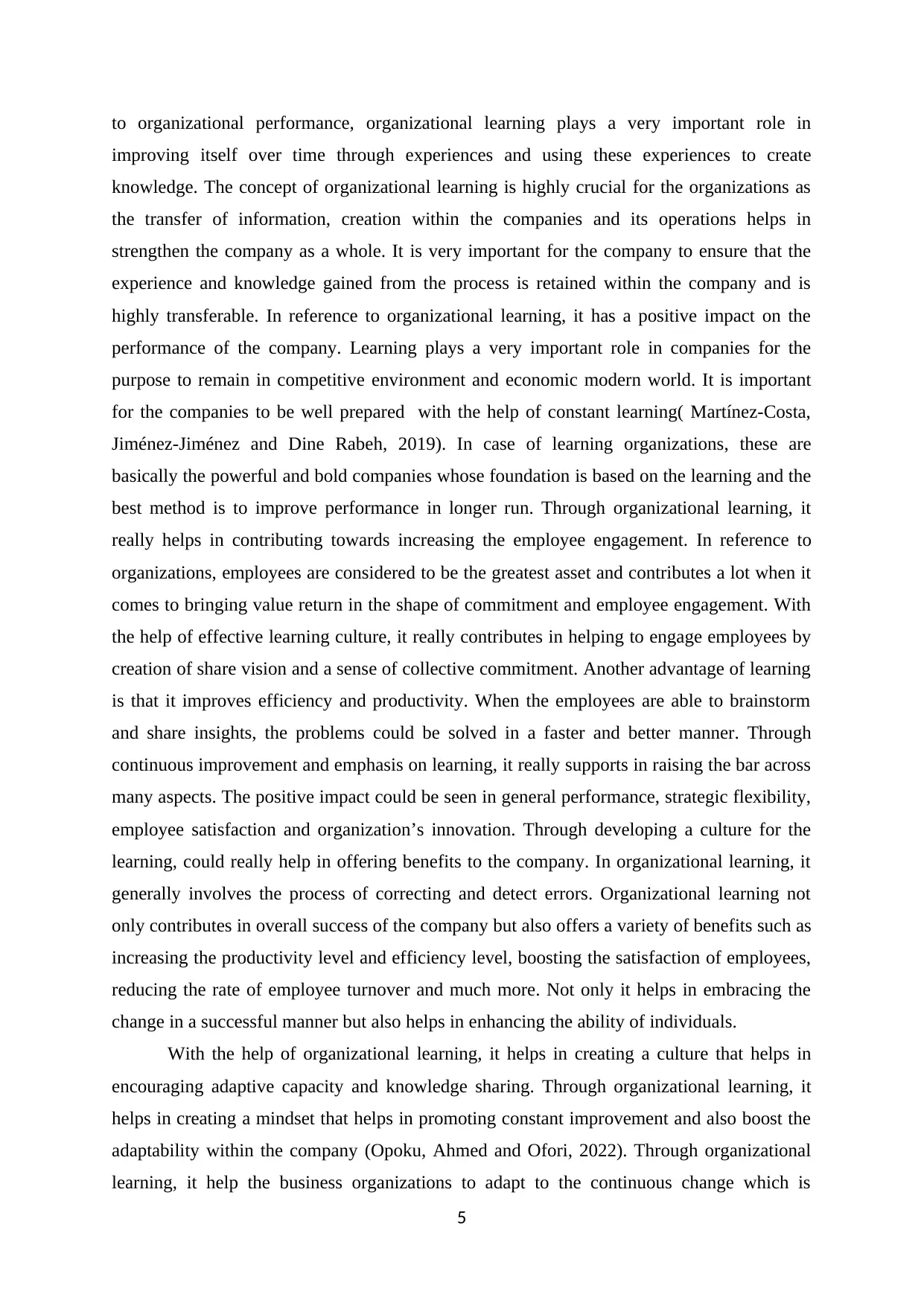
to organizational performance, organizational learning plays a very important role in
improving itself over time through experiences and using these experiences to create
knowledge. The concept of organizational learning is highly crucial for the organizations as
the transfer of information, creation within the companies and its operations helps in
strengthen the company as a whole. It is very important for the company to ensure that the
experience and knowledge gained from the process is retained within the company and is
highly transferable. In reference to organizational learning, it has a positive impact on the
performance of the company. Learning plays a very important role in companies for the
purpose to remain in competitive environment and economic modern world. It is important
for the companies to be well prepared with the help of constant learning( Martínez-Costa,
Jiménez-Jiménez and Dine Rabeh, 2019). In case of learning organizations, these are
basically the powerful and bold companies whose foundation is based on the learning and the
best method is to improve performance in longer run. Through organizational learning, it
really helps in contributing towards increasing the employee engagement. In reference to
organizations, employees are considered to be the greatest asset and contributes a lot when it
comes to bringing value return in the shape of commitment and employee engagement. With
the help of effective learning culture, it really contributes in helping to engage employees by
creation of share vision and a sense of collective commitment. Another advantage of learning
is that it improves efficiency and productivity. When the employees are able to brainstorm
and share insights, the problems could be solved in a faster and better manner. Through
continuous improvement and emphasis on learning, it really supports in raising the bar across
many aspects. The positive impact could be seen in general performance, strategic flexibility,
employee satisfaction and organization’s innovation. Through developing a culture for the
learning, could really help in offering benefits to the company. In organizational learning, it
generally involves the process of correcting and detect errors. Organizational learning not
only contributes in overall success of the company but also offers a variety of benefits such as
increasing the productivity level and efficiency level, boosting the satisfaction of employees,
reducing the rate of employee turnover and much more. Not only it helps in embracing the
change in a successful manner but also helps in enhancing the ability of individuals.
With the help of organizational learning, it helps in creating a culture that helps in
encouraging adaptive capacity and knowledge sharing. Through organizational learning, it
helps in creating a mindset that helps in promoting constant improvement and also boost the
adaptability within the company (Opoku, Ahmed and Ofori, 2022). Through organizational
learning, it help the business organizations to adapt to the continuous change which is
5
improving itself over time through experiences and using these experiences to create
knowledge. The concept of organizational learning is highly crucial for the organizations as
the transfer of information, creation within the companies and its operations helps in
strengthen the company as a whole. It is very important for the company to ensure that the
experience and knowledge gained from the process is retained within the company and is
highly transferable. In reference to organizational learning, it has a positive impact on the
performance of the company. Learning plays a very important role in companies for the
purpose to remain in competitive environment and economic modern world. It is important
for the companies to be well prepared with the help of constant learning( Martínez-Costa,
Jiménez-Jiménez and Dine Rabeh, 2019). In case of learning organizations, these are
basically the powerful and bold companies whose foundation is based on the learning and the
best method is to improve performance in longer run. Through organizational learning, it
really helps in contributing towards increasing the employee engagement. In reference to
organizations, employees are considered to be the greatest asset and contributes a lot when it
comes to bringing value return in the shape of commitment and employee engagement. With
the help of effective learning culture, it really contributes in helping to engage employees by
creation of share vision and a sense of collective commitment. Another advantage of learning
is that it improves efficiency and productivity. When the employees are able to brainstorm
and share insights, the problems could be solved in a faster and better manner. Through
continuous improvement and emphasis on learning, it really supports in raising the bar across
many aspects. The positive impact could be seen in general performance, strategic flexibility,
employee satisfaction and organization’s innovation. Through developing a culture for the
learning, could really help in offering benefits to the company. In organizational learning, it
generally involves the process of correcting and detect errors. Organizational learning not
only contributes in overall success of the company but also offers a variety of benefits such as
increasing the productivity level and efficiency level, boosting the satisfaction of employees,
reducing the rate of employee turnover and much more. Not only it helps in embracing the
change in a successful manner but also helps in enhancing the ability of individuals.
With the help of organizational learning, it helps in creating a culture that helps in
encouraging adaptive capacity and knowledge sharing. Through organizational learning, it
helps in creating a mindset that helps in promoting constant improvement and also boost the
adaptability within the company (Opoku, Ahmed and Ofori, 2022). Through organizational
learning, it help the business organizations to adapt to the continuous change which is
5
⊘ This is a preview!⊘
Do you want full access?
Subscribe today to unlock all pages.

Trusted by 1+ million students worldwide
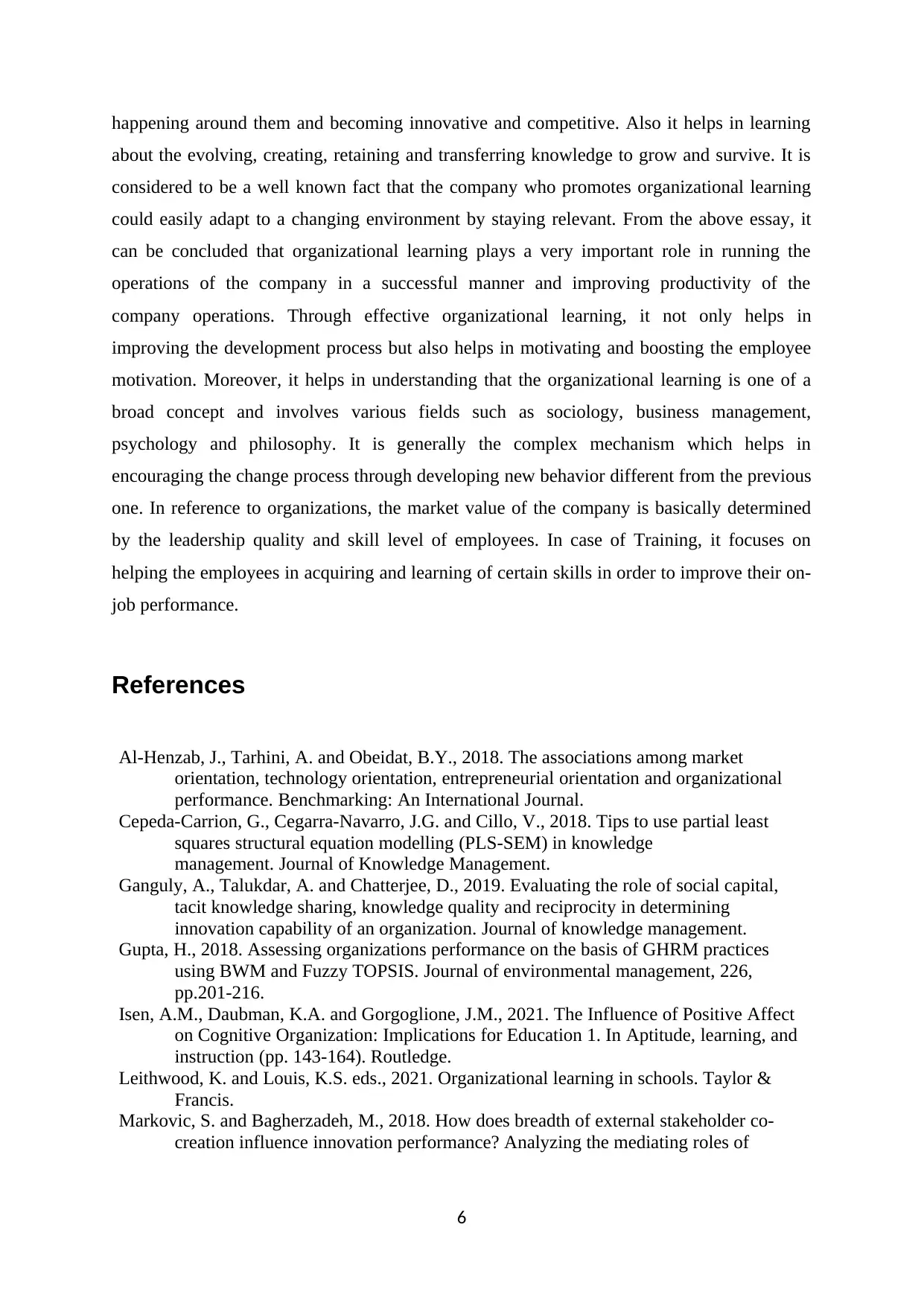
happening around them and becoming innovative and competitive. Also it helps in learning
about the evolving, creating, retaining and transferring knowledge to grow and survive. It is
considered to be a well known fact that the company who promotes organizational learning
could easily adapt to a changing environment by staying relevant. From the above essay, it
can be concluded that organizational learning plays a very important role in running the
operations of the company in a successful manner and improving productivity of the
company operations. Through effective organizational learning, it not only helps in
improving the development process but also helps in motivating and boosting the employee
motivation. Moreover, it helps in understanding that the organizational learning is one of a
broad concept and involves various fields such as sociology, business management,
psychology and philosophy. It is generally the complex mechanism which helps in
encouraging the change process through developing new behavior different from the previous
one. In reference to organizations, the market value of the company is basically determined
by the leadership quality and skill level of employees. In case of Training, it focuses on
helping the employees in acquiring and learning of certain skills in order to improve their on-
job performance.
References
Al-Henzab, J., Tarhini, A. and Obeidat, B.Y., 2018. The associations among market
orientation, technology orientation, entrepreneurial orientation and organizational
performance. Benchmarking: An International Journal.
Cepeda-Carrion, G., Cegarra-Navarro, J.G. and Cillo, V., 2018. Tips to use partial least
squares structural equation modelling (PLS-SEM) in knowledge
management. Journal of Knowledge Management.
Ganguly, A., Talukdar, A. and Chatterjee, D., 2019. Evaluating the role of social capital,
tacit knowledge sharing, knowledge quality and reciprocity in determining
innovation capability of an organization. Journal of knowledge management.
Gupta, H., 2018. Assessing organizations performance on the basis of GHRM practices
using BWM and Fuzzy TOPSIS. Journal of environmental management, 226,
pp.201-216.
Isen, A.M., Daubman, K.A. and Gorgoglione, J.M., 2021. The Influence of Positive Affect
on Cognitive Organization: Implications for Education 1. In Aptitude, learning, and
instruction (pp. 143-164). Routledge.
Leithwood, K. and Louis, K.S. eds., 2021. Organizational learning in schools. Taylor &
Francis.
Markovic, S. and Bagherzadeh, M., 2018. How does breadth of external stakeholder co-
creation influence innovation performance? Analyzing the mediating roles of
6
about the evolving, creating, retaining and transferring knowledge to grow and survive. It is
considered to be a well known fact that the company who promotes organizational learning
could easily adapt to a changing environment by staying relevant. From the above essay, it
can be concluded that organizational learning plays a very important role in running the
operations of the company in a successful manner and improving productivity of the
company operations. Through effective organizational learning, it not only helps in
improving the development process but also helps in motivating and boosting the employee
motivation. Moreover, it helps in understanding that the organizational learning is one of a
broad concept and involves various fields such as sociology, business management,
psychology and philosophy. It is generally the complex mechanism which helps in
encouraging the change process through developing new behavior different from the previous
one. In reference to organizations, the market value of the company is basically determined
by the leadership quality and skill level of employees. In case of Training, it focuses on
helping the employees in acquiring and learning of certain skills in order to improve their on-
job performance.
References
Al-Henzab, J., Tarhini, A. and Obeidat, B.Y., 2018. The associations among market
orientation, technology orientation, entrepreneurial orientation and organizational
performance. Benchmarking: An International Journal.
Cepeda-Carrion, G., Cegarra-Navarro, J.G. and Cillo, V., 2018. Tips to use partial least
squares structural equation modelling (PLS-SEM) in knowledge
management. Journal of Knowledge Management.
Ganguly, A., Talukdar, A. and Chatterjee, D., 2019. Evaluating the role of social capital,
tacit knowledge sharing, knowledge quality and reciprocity in determining
innovation capability of an organization. Journal of knowledge management.
Gupta, H., 2018. Assessing organizations performance on the basis of GHRM practices
using BWM and Fuzzy TOPSIS. Journal of environmental management, 226,
pp.201-216.
Isen, A.M., Daubman, K.A. and Gorgoglione, J.M., 2021. The Influence of Positive Affect
on Cognitive Organization: Implications for Education 1. In Aptitude, learning, and
instruction (pp. 143-164). Routledge.
Leithwood, K. and Louis, K.S. eds., 2021. Organizational learning in schools. Taylor &
Francis.
Markovic, S. and Bagherzadeh, M., 2018. How does breadth of external stakeholder co-
creation influence innovation performance? Analyzing the mediating roles of
6
Paraphrase This Document
Need a fresh take? Get an instant paraphrase of this document with our AI Paraphraser
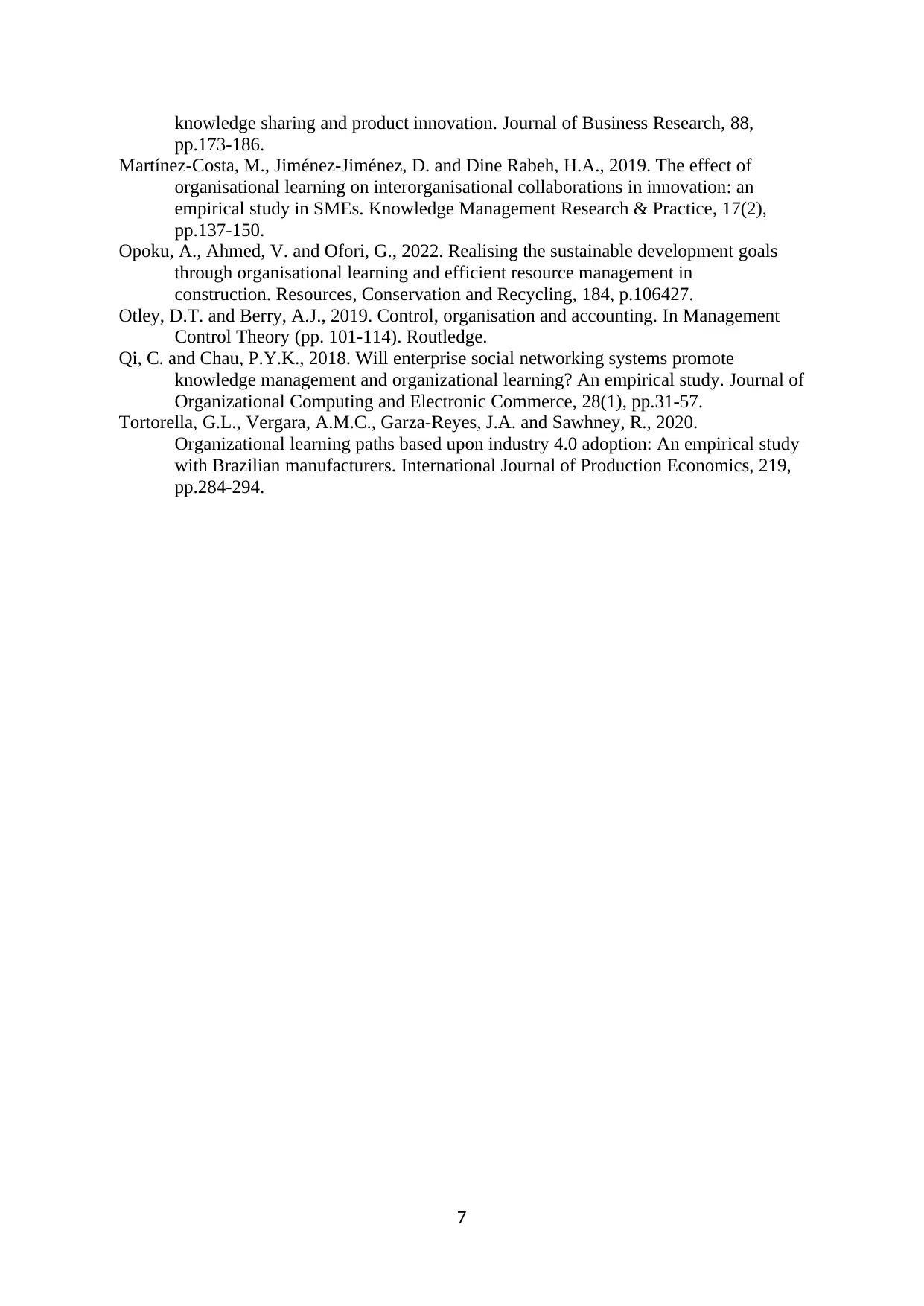
knowledge sharing and product innovation. Journal of Business Research, 88,
pp.173-186.
Martínez-Costa, M., Jiménez-Jiménez, D. and Dine Rabeh, H.A., 2019. The effect of
organisational learning on interorganisational collaborations in innovation: an
empirical study in SMEs. Knowledge Management Research & Practice, 17(2),
pp.137-150.
Opoku, A., Ahmed, V. and Ofori, G., 2022. Realising the sustainable development goals
through organisational learning and efficient resource management in
construction. Resources, Conservation and Recycling, 184, p.106427.
Otley, D.T. and Berry, A.J., 2019. Control, organisation and accounting. In Management
Control Theory (pp. 101-114). Routledge.
Qi, C. and Chau, P.Y.K., 2018. Will enterprise social networking systems promote
knowledge management and organizational learning? An empirical study. Journal of
Organizational Computing and Electronic Commerce, 28(1), pp.31-57.
Tortorella, G.L., Vergara, A.M.C., Garza-Reyes, J.A. and Sawhney, R., 2020.
Organizational learning paths based upon industry 4.0 adoption: An empirical study
with Brazilian manufacturers. International Journal of Production Economics, 219,
pp.284-294.
7
pp.173-186.
Martínez-Costa, M., Jiménez-Jiménez, D. and Dine Rabeh, H.A., 2019. The effect of
organisational learning on interorganisational collaborations in innovation: an
empirical study in SMEs. Knowledge Management Research & Practice, 17(2),
pp.137-150.
Opoku, A., Ahmed, V. and Ofori, G., 2022. Realising the sustainable development goals
through organisational learning and efficient resource management in
construction. Resources, Conservation and Recycling, 184, p.106427.
Otley, D.T. and Berry, A.J., 2019. Control, organisation and accounting. In Management
Control Theory (pp. 101-114). Routledge.
Qi, C. and Chau, P.Y.K., 2018. Will enterprise social networking systems promote
knowledge management and organizational learning? An empirical study. Journal of
Organizational Computing and Electronic Commerce, 28(1), pp.31-57.
Tortorella, G.L., Vergara, A.M.C., Garza-Reyes, J.A. and Sawhney, R., 2020.
Organizational learning paths based upon industry 4.0 adoption: An empirical study
with Brazilian manufacturers. International Journal of Production Economics, 219,
pp.284-294.
7
1 out of 8
Related Documents
Your All-in-One AI-Powered Toolkit for Academic Success.
+13062052269
info@desklib.com
Available 24*7 on WhatsApp / Email
![[object Object]](/_next/static/media/star-bottom.7253800d.svg)
Unlock your academic potential
Copyright © 2020–2026 A2Z Services. All Rights Reserved. Developed and managed by ZUCOL.




